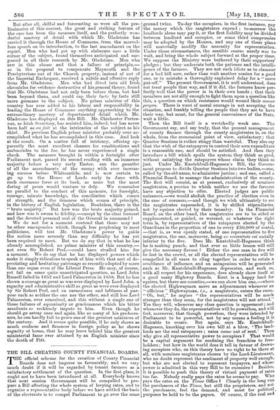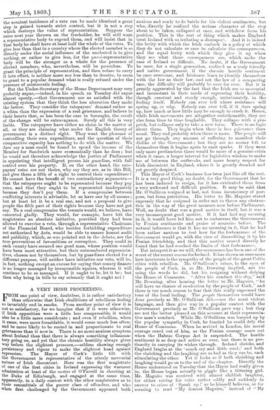THE BILL CREATING COUNTY FINANCIAL BOARDS.
THE official scheme for the creation of County Financial Boards does not impress us favourably, and we very much doubt if it will be regarded by tenant farmers as a satisfactory settlement of the question. In the first place, it ought not to have been introduced at all. Everybody knows that next session Government will be compelled to prepare a Bill affecting the whole system of levying rates, and to organize a representative body before we have settled the basis of the electorate is to compel Parliament to go over the same ground twice. To-day the occupiers, in the first instance, pay the money which the magistrates expend ; to-morrow thelandlords alone may pay it, or the first liability may be divided
between landlord and occupier, or some third compromise may be adopted by the Houses, and any one of these plans willmaterially modify the necessity for representation.
Under those circumstances, the sensible course surely was to wait, and bring the whole subject forward at the proper time. We suppose the Ministry were bothered by their supporters' pledges ; but they underrate both the patience and the intelligence of the farmers. They are not such idiots as to clamour for a bad bill now, rather than wait another session for a good one, or to mistake a thoroughly explained delay for a "mere put-off." The present Government, it is well understood, does not treat people that way, and if it did, the farmers know perfectly well that the power is in their own hands ; that their members are not silly enough to fight them upon a question like
this, a question on which resistance would wound their amour propre. There is want of moral courage in not accepting the
situation, and frankly telling the people that they are to have their way, but must, for the general convenience of the State, wait a little.
Then the Bill itself is a wretchedly weak one. The Government say, and say truly, that the present management of county finance through the county magistrates is, on the whole, from the economical point of view, satisfactory ; that Quarter Sessions is rather stingy than wasteful. They also say that the wish of the ratepayers to control their own expenditure is a reasonable one, and should be satisfied. And then they introduce a bill which spoils the system they think so good, without satisfying the ratepayers whose claim they think so
just. Under Mr. Knatchbull-Hugessen's Bill, the Government propose to divide Quarter Sessions into two bodies,—oner
called by the old name, to administer justice ; and one, called a Financial Board, to manage the administration of the county. The first will consist, as at present, exclusively of nomineemagistrates, a proviso to which neither we nor the farmers have any objection to offer. Elected judges are public nuisances,—we would abolish the practice of election even in the case of coroners,—and though we wish ultimately to see the magistrates superseded, it is by skilled stipendiaries, not by squires elected by their tenantry. In the Financial Board, on the other hand, the magistrates are to be aided or
supplemented, or guided, or watered, or whatever the right term is, by representatives of the ratepayers elected by the Guardians in the proportion of one to every £50,000 of rental, —that is, as was openly stated, of one representative to fivemagistrates, the one, moreover, being ex necessitate rd socially
inferior to the five. Does Mr. Knatchbull-Hugessen think he is making punch, and that ever so little lemon will still give the necessary flavour ? Either the one man in five will be lost in the crowd, or all the elected representatives will be compelled in all cases to cling together in order to retain a semblance of influence, and an antagonism will be generated such as Mr. Knatchbull-Hugessen deprecates, and such as, with all respect for his experience, does already show itself at a good many Highway Boards. Kent is a happy land for squires, but there are counties,—we can show him one,—where the elected Highwaymen move an adjournment whenever an " officious " Highwayman, i.e., a magistrate, enters the room" Oh, but," he argues "the representatives will be much stronger than they seem, for the magistrates will not attend." Yes they will, whenever any class question is uppermost; and whenever they do, the representatives will be powerless, and will feel, moreover, that though powetless, they were intended by Parliament to be powerful, not by any means a feeling it is desirable to create. But again, says Mr. KnatchbullHugessen, knocking over his own bill at a blow, The land lords are the real ratepayers ; rates come out of rent.' Then why give all representative power to occupiers? That would be a capital argument for confining the franchise to free holders ; but how in the world does it tell in favour of drown ing occupiers who, on this theory have no right to be there at all, with nominee magistrates chosen by the Lord-Lieutenant, who no doubt represent the sentiment of property well enough, but who are not elected to represent taxpayers, and whose power is admitted in this very Bill to be excessive? Besides,
it is possible to push this theory of virtual payment of rates too far. Nobody really pays the rates he seems to pay. Who pays the rates on the Times Office? Clearly in the long run the purchasers of the Times, but still the proprietors, and not the purchasers, feel the demand, and must for political. purposes be held to be the payers. Of course, if the real and the nominal incidence of a rate can be made identical a great step is gained towards strict control, but it is not a step which destroys the value of representation. Suppose the rates next year thrown on the freeholder, he will still want a representative body to expend them, and will insist that in that body he shall have at least half the whole of the votes. To give less than that in a country where the elected member is so directly under the social influence of the unelected is to give nothing, or rather to give less, for the quasi-representative body will be the stronger as a whole for the presence of elected members, who, nevertheless, will be powerless. To grant the principle of representation, and then refuse to carry it into effect, is neither more nor less than to deceive, to seem to grant to a popular demand what is really refused under the pressure of aristocratic feeling.
But the Under-Secretary of the Home Department may very probably argue,—indeed, in his speech on Tuesday did argue almost openly,—that Government are so satisfied with the existing system that they think the less alteration they make the better. They consider the ratepayers' demand rather as a whim than the expression of a real grievance, and believe in their hearts that, as has been the case in boroughs, the result of the change will be extravagance. Surely all this is very feeble. The ratepayers have either no claim in the matter at all, or they are claiming what under the English theory of government is a distinct right. They want the pleasure of controlling their own expenditure, and the question of their comparative capacity has nothing to do with the matter. We dare say a man could be found to spend the income of the Member for Sandwich more economically than he does ; but he would not therefore acknowledge the justice of Parliament in appointing that intelligent person his guardian, with full control over his property. If, on the other hand, the ratepayers' rates are not theirs, why say they are, as in this Bill, and give them a fifth of a right to control their expenditure ? He cannot have the benefit of two contradictory arguments— that the ratepayers ought to be represented because they pay rates, and that they ought to be represented inadequately because they don't pay them. If a compromise between conflicting interests is advisable, let us have one by all means ; but at least let it be a real one, and not a proposal to give people the fifth part of their rights because they have not got any. To a real compromise the tenants would, we believe, have consented gladly. They would, for example, have left the magistrates an absolute initiative, provided they had been allowed to exercise a veto, through a representative Chairman of the Financial Board, who besides forbidding expenditure not authorized by Acts, would be able to ensure honest audit and publicity, which, as was pointed out in the debate, are the true preventives of favouritism or corruption. They could in each county have secured one good man, whose position would have been most attractive, but their outnumbered representatives, chosen not by themselves, but by guardians elected for a different purpose, will neither have initiative nor veto, will be, in fact, nothing except an excuse for saying that county finance is no longer managed by irresponsible squires, whereas it will continue to be so managed. If it ought to be, let it be ; but then why bring in bills to say solemnly that it ought not ?































 Previous page
Previous page